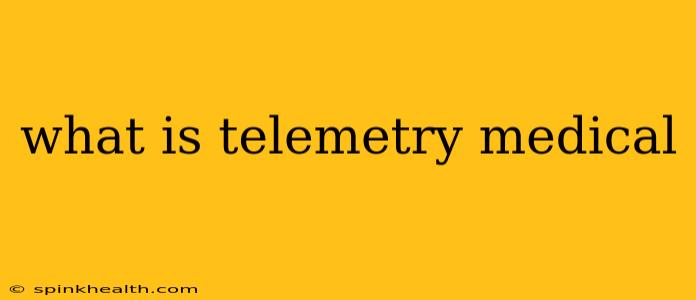What is Telemetry Medical? A Journey into Remote Patient Monitoring
Imagine a world where your doctor can constantly monitor your heart rate, blood pressure, and other vital signs, all from the comfort of your home. That's the power of telemetry medical. It's not about futuristic science fiction; it's a rapidly growing field transforming healthcare as we know it.
Telemetry, in the medical context, refers to the remote monitoring of patients' vital signs and other physiological data. This data is transmitted wirelessly, often through radio waves, from a patient's location to a central monitoring station, usually in a hospital or clinic. This allows healthcare professionals to track a patient's condition continuously, providing proactive care and faster intervention if necessary.
Let's embark on a deeper exploration of this fascinating field, answering some common questions along the way.
How Does Telemetry Medical Work?
Telemetry medical relies on a combination of wearable sensors and sophisticated data analysis. Think of it as a sophisticated, interconnected system. The patient wears a device—sometimes a simple patch, other times a more complex system—that continuously measures vital signs. This data is then transmitted wirelessly to a receiver, which relays the information to a central monitoring system. This system can alert healthcare professionals to any significant changes in the patient's condition, allowing for timely interventions. It's like having a silent guardian, constantly watching over your health.
What are the Different Types of Telemetry Medical Devices?
The world of telemetry medical devices is constantly evolving, offering diverse options depending on the patient's needs and the data being monitored.
- ECG Telemetry: This is the most common type, focusing on continuous heart rhythm monitoring. It's invaluable for detecting arrhythmias and other heart conditions.
- Blood Pressure Telemetry: This involves continuous or intermittent monitoring of blood pressure, crucial for managing hypertension and other cardiovascular issues.
- SpO2 Telemetry: Measuring blood oxygen saturation levels, this type of telemetry is vital for patients with respiratory conditions.
- Temperature Telemetry: Monitoring body temperature remotely is useful for patients recovering from surgery or those with infections.
- Holter Monitors: These portable devices record ECG data for extended periods, often 24-48 hours, allowing for the detection of intermittent heart irregularities.
What are the Benefits of Telemetry Medical?
The advantages of telemetry medical are substantial and far-reaching.
- Early Detection of Problems: Continuous monitoring allows for the early detection of potential health issues, enabling timely interventions and preventing serious complications.
- Improved Patient Outcomes: Early detection, coupled with prompt treatment, translates to improved patient outcomes and reduced hospital readmissions.
- Reduced Healthcare Costs: By preventing hospitalizations and reducing the need for emergency room visits, telemetry can significantly reduce healthcare costs.
- Enhanced Patient Comfort: Patients can receive high-quality care in the comfort of their homes, reducing stress and improving their overall experience.
- Increased Efficiency for Healthcare Professionals: Telemetry allows healthcare professionals to monitor multiple patients simultaneously, improving efficiency and workflow.
What are the Potential Drawbacks of Telemetry Medical?
While telemetry offers significant advantages, it's essential to acknowledge some potential limitations:
- Cost of Equipment: The initial investment in telemetry equipment can be high.
- Technical Issues: Wireless transmission can be susceptible to interference and technical malfunctions.
- Patient Compliance: Successful telemetry monitoring relies on patient compliance in wearing and properly using the equipment.
- Data Security and Privacy: Protecting patient data is paramount, and robust security measures are crucial.
How is Telemetry Used in Different Medical Specialties?
Telemetry plays a significant role in various medical specialties:
- Cardiology: ECG telemetry is essential for managing heart conditions.
- Pulmonology: SpO2 and respiratory rate telemetry are crucial for monitoring respiratory conditions.
- Neurology: Telemetry can be used to monitor neurological activity.
- Geriatrics: Telemetry helps in managing chronic conditions in the elderly population.
- Post-surgical Care: Telemetry helps monitor patients after surgery to detect any early signs of complications.
Telemetry medical is revolutionizing healthcare by bringing continuous monitoring and proactive care to patients. While challenges exist, the benefits are undeniable, promising a future where healthcare is more efficient, effective, and patient-centered. The silent guardian of your health is becoming increasingly sophisticated, and that’s something to celebrate.

